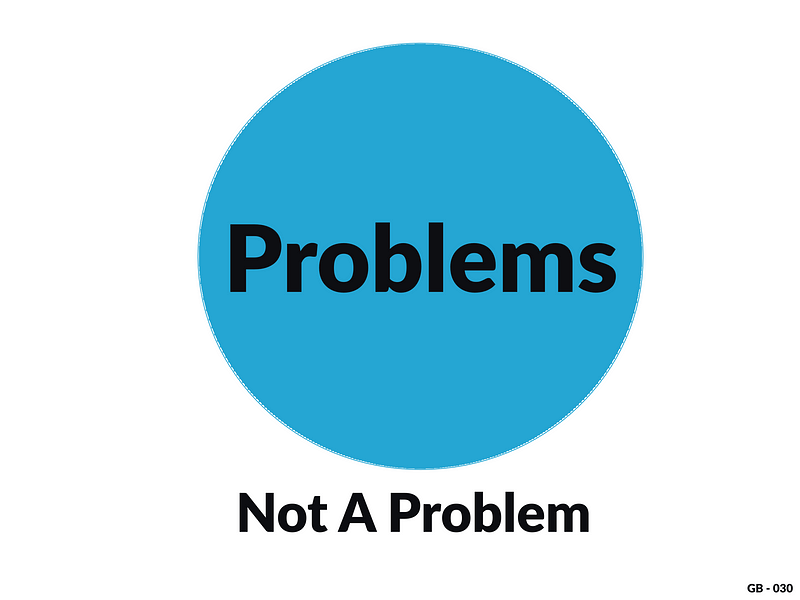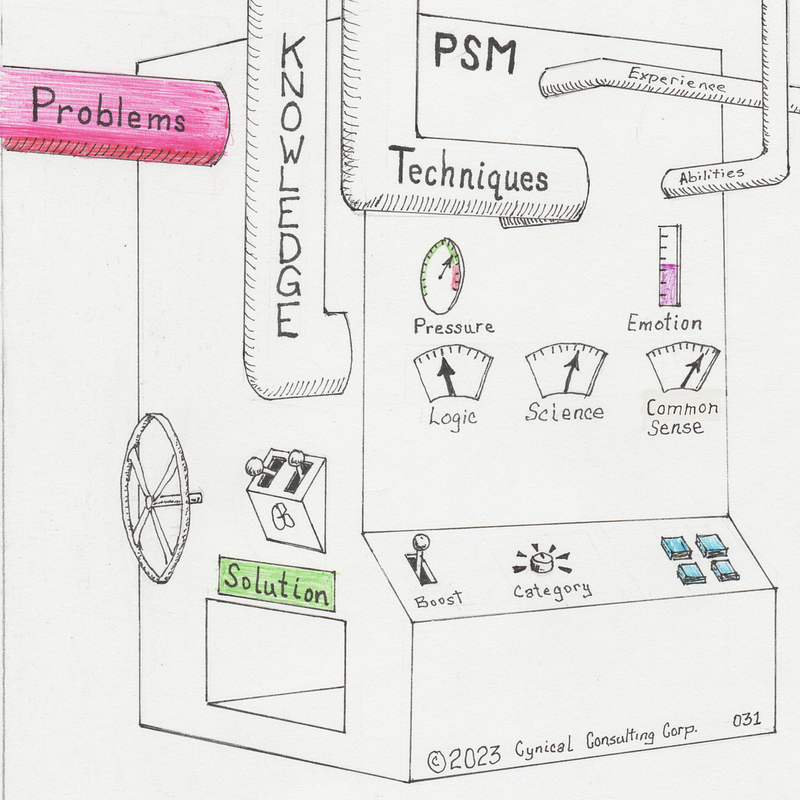Good News - Everything Is a Problem

What? No Problems…
If you say you have NO problems, most people would likely congratulate you!!
I shake my head and say, “Carry on, then…”
If you believe you have absolutely NO problems, it indicates that:
- You are not pursuing goals, or,
- You are oblivious to the problems in front of you, or
- Worst of all, you are oblivious to the problems you create for others.
“Problem” is defined as “a question raised for inquiry, consideration, or solution.”
What you likely mean if you say you “have no problems” is that the problems you do have are not causing you any stress.
Living is about constantly solving problems until those that remain are trivial.
- Gary Bozek (2023-02-02)
Problems Are Personal
Your problems are unique.
We are all on different journeys through life.
The types of problems we encounter depend on our path, how far we are down the path, and what we’ve done in the past.
Our ability to solve problems depends on several factors:
Perception
Our reality is what we perceive it to be.
Even if I have the SAME problem as someone, my perception of the issue - its relevance, impact, and severity - can be vastly different. For example, losing a job may seem like a catastrophe to me, and a minor irritation to another.
My knowledge and experience will influence my view of the seriousness of a problem. If I have experienced it previously and have successfully overcome it, I will not be as panicked as someone who encounters it for the first time.
Similarly, if I feel the problem is weighty, I increase its priority and deal with it sooner.
Recognition
The sooner a problem is identified, the quicker corrective action can be taken.
If I do not recognize a problem when it first rears its head, it could grow until it takes far more effort to correct it.
For example, if I spot low tire pressure, I can correct it and monitor pressure loss. If I miss spotting the issue, it will worsen until the tire sidewall weakens and blows out. Then I have a bigger problem, requiring significant effort.
Your ability to perceive and mitigate issues before they become serious reduces stress.
Capability
Everyone has different capabilities.
A problem may seem complex to one person and simple to another. The competence to tackle a problem will depend on our experience, knowledge, and ability.
For example, if I don’t have mechanical talent, or don’t possess the required tools, I may not want to change the wheel bearings on my vehicle. In contrast, someone with plenty of experience working on vehicles will view that as an easy task.
Our unique proficiency determines the sophistication of the problems we can resolve.
Confidence
Problems seem more serious if you haven’t encountered them before.
As complexity increases, the answer seems to be proportionally more difficult. As we move out of our problem-solving comfort zone, we may feel more apprehension about working out a solution.
When I was younger, I had difficulty dealing with relationships and feelings because it was something I avoided. As I faced my internal obstacles and identified my emotional barriers, I was able to start discussing my feelings. With more practice, I developed the confidence to share more and more.
My confidence in my problem-solving prowess is directly proportional to the complexity of the problems I will tackle.
Types of Problems
There are many ways to classify problems.
For this essay, I am positing that everything is a problem. You may or may not agree.
To make my case, I will classify problems into two categories.
Obvious Problems
This categorization is for everything that I view as a traditional problem.
I can explain to someone why I view it as a problem. Although someone else may not think the problem is as grave as I feel it is, they can appreciate why I think it is a problem.
Obvious problems have the following characteristics:
- they are challenges or issues that need to be conquered
- they often cause you pain or discomfort (physically or emotionally)
- they need an immediate or near-term resolution
- you are reactive — something happened — and you need to respond
If you asked someone, they would identify them as conventional types of problems.
Non-Obvious Problems
This categorization is for everything not commonly viewed as a problem.
They include goals, dreams, aspirations, intentions, and plans.
You may not think of these as problems, but if we go back to the definition, “a question raised for inquiry, consideration, or solution”, they would meet that definition. You pursue goals, dreams, and plans to create a future solution.
Non-obvious problems have the following characteristics:
- they are a challenge or issue that you are actively pursuing
- they provide pleasure or a benefit of some sort
- they are future-oriented
- you take proactive action — you want to create a future result
Non-obvious problems are things you want to do but haven’t done yet.
These two categories, obvious and non-obvious problems, cover the universe of things you want to accomplish in your life or get in the way of that achievement.
Problem-Solving Methodology
There is power in viewing everything as a problem.
If you have a problem-solving methodology, you have a process you can use to solve any problem you encounter.

Success is directly proportional to your ability to solve problems.
- Gary Bozek (2022-08-29)
In the Information Technology (IT) world, methodologies and algorithms are the bread and butter of programmers, systems analysts, business analysts, and project managers.
If you are unfamiliar with the terms, a methodology describes a process to follow to accomplish a task. An algorithm is a step-by-step procedure to solve a problem or complete a task.
My background in IT influences how I approach the world at large. I use the same techniques and processes I used in my consulting practice to solve all problems (because I view everything as a problem).
Therefore, I have confidence in tackling ANY problem. When I lack knowledge or experience in a specific subject domain, I apply the methodology and create a solution.
I have seen so many problems in my business and personal life that another aspect of my IT training starts kicking in: I identify patterns. When I encounter a challenge that matches an existing pattern, I know I can apply similar inputs and a standard process to produce a solution.
The beauty of using a methodology is that it handles any complex problem.
A complex problem can be decomposed into many smaller problems. By applying the methodology and solving each problem individually, each solution can be aggregated to solve the larger problem.
To use the problem-solving methodology, you must possess these skills:
- How to identify, understand, and categorize problems
- How to identify a range of solution options
- How to pick the best solution to implement
How to implement a solution is another distinct series of essays.
My Problem
I can’t propose a solution to any particular problem you may be experiencing today.
I don’t know enough about your specific issues, circumstances, and contributing factors to propose a solution in this essay. Without gathering the specifics about your issues, your goals, and the variables involved, I cannot understand the complexity of your problem.
So, if I can’t possibly understand your problem, how can I help you?
As the proverb says, “Give a man a fish and you feed him for a day; teach a man to fish and you feed him for a lifetime.”
My intention is, throughout this series, to provide you with a methodology that you can use to resolve any class of problems.
Be Cynical,
GB
Summary
TL;DR: If you treat everything as a problem, you can apply a methodology to get consistent results.
Wisdom:
- Change your orientation to view all challenges or issues as problems
- Obvious Problems cause you pain or distress and need an immediate response; you must react
- Non-obvious Problems deliver pleasure or benefits, and are future-oriented; you can be proactive
- Applying a Problem-Solving Methodology can be used to consistently resolve ALL problems
To extract the best value from this article, you should have read this first: Read First, About Me
The next article in this series is: The Key Factor in Your Success.






Member discussion